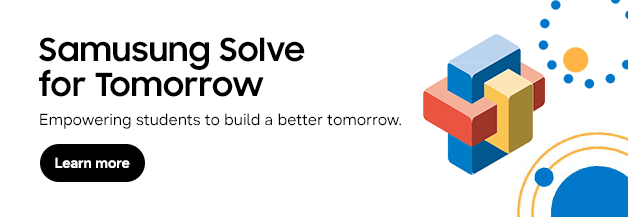Samsung Solve for Tomorrow Sustainability Winner on ‘Changing the World Without Changing Behaviors’
8/19/2024

Green Street Academy High School, Sustainability Innovation Award Winner, with Meghan Conklin, Chief Sustainability Officer to Maryland Governor Wes Moore
“We wanted to change the world without changing behaviors,” student Marquel Johns told more than 200 Samsung Electronics America employees during our latest internal Sustainability 101 webinar series.
Marquel was explaining the origin of Ecotech – the featured entrepreneurial startup on the webinar – and its innovative line of such paper-like products as artisanal writing materials, insulating drinks collars, and coasters that are all manufactured from sargassum. This overabundant invasive seaweed is washing ashore on Atlantic Coast beaches and otherwise being hauled off to landfills as waste before it rots and creates toxins that enter into air and water. Substituting more sustainable raw material in commonly used objects doesn’t require consumers to change behavior but still improves our world.
Together with fellow classmates Esosa Osayande and Daki Alston, Marquel was part of the student team from Baltimore’s Green Street Academy High School that earned the ‘Sustainability Innovation’ Award during the Samsung Solve for Tomorrow (SFT) science, technology, engineering, and math (STEM) competition for public middle and high school students. SFT challenges 6th through 12th graders to identify a pressing issue in their local community and use their STEM skills to solve it.

The team presenting at the 2023-2024 Samsung Solve for Tomorrow National Finalist Pitch Event.
Daki, an asthma sufferer, detailed that Baltimore has a very high incidence of asthma, 13.7% of the population compared with a national average of 9%, in part due to the persistent air quality issues in the community and municipal incineration of post-consumer paper and plastic waste. The Green Street Academy student team set out to address those linked problems – and their research led them to seek a replacement for forest-derived paper pulp. They found their raw material in sargassum seaweed, which is experiencing unprecedented growth due to rising ocean temperatures, and causing its own air quality, human health, and disposal problems for coastal communities.
Reflecting a growing trend among award-winning SFT entries, the Green Street Academy team and their teacher and mentor Harry F. Preston V, who also joined the webinar, are pursuing entrepreneurial avenues to sustain their Solve for Tomorrow project beyond the competition. They aim to continue benefiting their community, even as the trio students have graduated high school and moved on to college to pursue engineering studies. Hence the foundation of Ecotech, which will formally launch this month as it completes the process of raising seed capital, with their former high school and school district as potential first clients.
Samsung employees on the webinar were highly engaged with the Green Street Academy presenters. Thumbs up and clapping hands emojis flowed in a steady stream across the screen, as the students were peppered with questions about the inspirations behind Ecotech, details of the manufacturing process, cost and environmental comparisons with forest product-based paper, whether the team had considered ways to automate the labor-intensive process of collecting sargassum, and why traditional paper producers don’t simply use sargassum themselves.
Among the answers:
- Ecotech sargassum-based products have a lower carbon footprint — projected to produce 80% fewer emissions compared to traditional paper. Simply put, breaking trees down into paper pulp is incredibly heat and chemical intensive – requiring large amounts of fuel and water, and generating significant levels of pollutants.
- Personal familiarity with the core issues that Ecotech addresses – Daki’s asthma and a classmate’s family who live near coasts under siege from sargassum – provided important motivations for this team. Exploring potential solutions, the team also met with community officials in South Florida to discuss the feasibility of sourcing sargassum.
- A new crop of Green Street Academy students in Harry Preston’s robotics class are already stepping up to think about designing autonomous robot collection devices to harvest the low-to-no cost sargassum raw material that communities otherwise have to pay to be hauled away for disposal.

The students conducted research with subject matter experts, including the Mayor’s office in Miami, Fl.
Many Samsung employees, especially after hearing about the students’ goal to raise $100,000 in seed funding, asked how they as individuals might support this social enterprise. Harry Preston directed them to thinkecotech.com, where visitors can sign up for a newsletter to learn about ways to contribute.
The Sustainability 101 webinar series educates Samsung employees about Samsung’s environmental strategy, which supports the Company’s goals to achieve net zero Scope 1,2 emissions by 2050, maximize resource circularity to contribute to a circular economy, and tackle environmental challenges through tech innovation.
To learn more about the Samsung Solve for Tomorrow STEM competition, which will be accepting entries starting late-August through late-October 2024, please visit samsung.com/solve.





